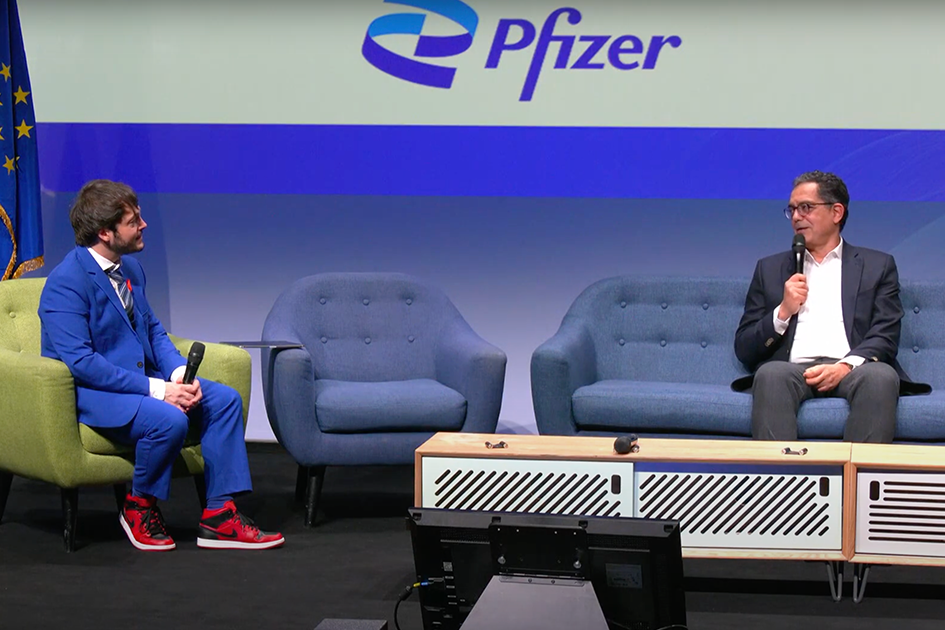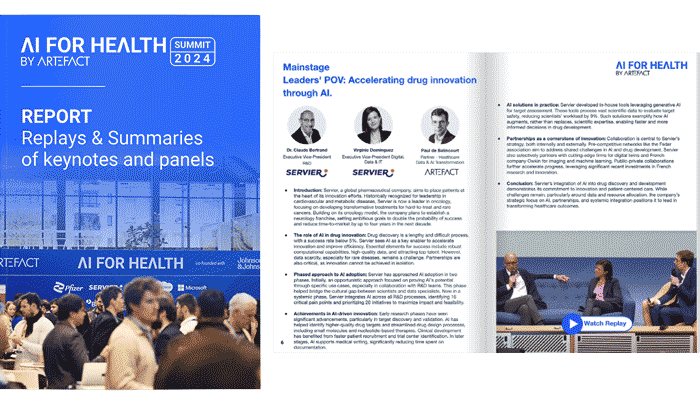AI Cumbre de la Salud - Edición 2024
Principales conclusiones del debate sobre "Inteligencia Artificial: On a mission to make drug development faster and smarter" entre Reda Guiha, Country President France en Pzifer, y Damien Gromier CEO & Founder de AI for Health.
Pfizer, famosa en todo el mundo por su vacuna COVID-19, está aprovechando Inteligencia Artificial para revolucionar el desarrollo de fármacos. AI se considera un elemento de cambio que afecta a todas las fases del proceso farmacéutico, desde la investigación preclínica hasta el acceso de los pacientes y la fabricación, con aplicaciones tanto operativas como transformadoras.
Impacto operativo de AI
AI mejora las tareas farmacéuticas cotidianas, como la preparación de expedientes reglamentarios, la elaboración de informes de seguridad y la eficiencia de la fabricación. Al optimizar estos procesos, AI no solo ahorra tiempo, sino que también reduce la huella de carbono y los ciclos de desarrollo, mejorando el rendimiento operativo general.
Aplicaciones transformadoras en el desarrollo de fármacos
AI permite avances significativos en el descubrimiento preclínico de fármacos y el desarrollo clínico. Por ejemplo, durante COVID-19, AI redujo los plazos de desarrollo preclínico de cuatro años a cuatro meses al reducir las pruebas de moléculas de 3 millones de compuestos a 600. Del mismo modo, AI aceleró los plazos de los ensayos clínicos de la vacuna COVID-19, poniendo en marcha ensayos en seis países e inscribiendo a 46.000 participantes en sólo cuatro meses, un proceso que tradicionalmente lleva años.
Reducción de costes y riesgos en el desarrollo clínico
AI aborda los crecientes costes de desarrollo de fármacos, que actualmente se acercan a los 4.000 millones de dólares por producto. Herramientas como AI agilizan el diseño de protocolos de ensayos clínicos, la preparación de expedientes reglamentarios y la limpieza de data , reduciendo costes y plazos. Translational AI garantiza el cumplimiento de la normativa local y mejora los procesos de consentimiento de los pacientes, lo que demuestra el papel de AIa la hora de agilizar y hacer más eficientes los ensayos.
La importancia de data en el éxito de AI
Data sirve de base a la innovación de AI . Con décadas de experiencia clínica en data y millones de puntos de data , Pfizer aprovecha AI para mejorar las tasas de éxito clínico, duplicándolas hasta casi el 20% en comparación con la media del sector, que se sitúa entre el 7 y el 10%. Sin embargo, para lograr estos resultados se necesitan conjuntos de datos sólidos, de alta calidad y diversos.
La colaboración como estrategia clave
Las asociaciones son esenciales para el avance de AI en la atención sanitaria. Pfizer colabora con distintos sectores, centros académicos y empresas emergentes, como demuestra su colaboración con IMI Big Picture, que crea una amplia base de datos con 3 millones de muestras de enfermedades. En Francia, el Pfizer Healthcare Hub pone en contacto a 40 nuevas empresas con expertos de todo el mundo, fomentando la innovación y acelerando el desarrollo de soluciones centradas en el paciente.
AI y la oportunidad de liderazgo de Europa
AI y las plataformas bioterapéuticas representan revoluciones convergentes en las ciencias de la vida, creando un renacimiento de la innovación. Aunque Europa va a la zaga de Estados Unidos en aprobación de medicamentos e innovación, Francia tiene potencial para liderar AI. Para lograrlo se requiere un marco regulador unificado, inversiones escalables y colaboración transfronteriza para superar las barreras culturales y lingüísticas.
Conclusión
AI está transformando el desarrollo de medicamentos y ofrece a Europa, y en particular a Francia, la oportunidad de liderar la innovación en ciencias de la vida. Centrándose en las asociaciones, la calidad data y la escalabilidad, Pfizer prevé un futuro en el que AI impulse soluciones sanitarias más rápidas, inteligentes y accesibles.

 BLOG
BLOG






